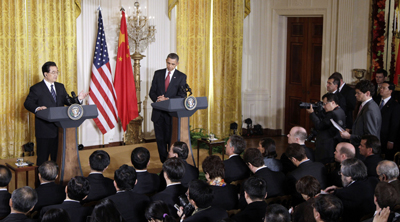Thanks to Ben Feller and Hans Nichols for raising questions about China’s human rights and press freedom record. A lot of Chinese journalists are grateful, too. When we urged U.S. President Barack Obama last week to raise press freedom concerns in his meetings with Chinese President Hu Jintao, we received no response. But when Feller of The Associated Press and Nichols of Bloomberg asked tough questions at the two leaders’ joint press conference on Wednesday, we knew someone was listening.
This is a tough moment for journalists in China. Hu Jia, who was jailed in 2008, is suffering from severe and unexplained abdominal pain while being imprisoned in Beijing. His wife, Zeng Jinyan, saw him last on January 14. She has told several support groups that he was recently moved to the prison’s hospital, but she hasn’t been able to get any more information. Hu Jia is serving a prison term of three and a half years after being convicted in 2008 for inciting subversion of state power.
If concern about Hu Jia’s health seems overwrought, keep in mind the death on December 31 of Zhang Jianhong, founder of Aiqinghai (Aegean Sea), a popular website closed by the Chinese government in 2006. Zhang, sentenced to six years in prison for “incitement to subvert the state’s authority” was released in June 2010 on medical parole after years of humanitarian appeals. Zhang, who suffered a disease of his nerve cells, died six months after his release, on December 31.
And, of course, Nobel Peace Prize winner Liu Xiabao is just a bit more than a year into his 11-year sentence on charges of inciting subversion against the state. To send him to prison, prosecutors cited articles he had published on overseas websites.
Here are Feller’s question and Nichols’ follow-up, according to the official transcript of Wednesday’s press conference. I’ve omitted Hu’s attempt to dodge the question; he simply didn’t reply to Feller. Nichols was having none of it, and asked the follow-up.
Feller put Obama and Hu on the spot:
President Obama, you’ve covered the broad scope of this relationship, but I’d like to follow up specifically on your comments about human rights. Can you explain to the American people how the United States can be so allied with a country that is known for treating its people so poorly, for using censorship and force to repress its people? Do you have any confidence that as a result of this visit that will change? … And, President Hu, I’d like to give you a chance to respond to this issue of human rights. How do you justify China’s record, and do you think that’s any of the business of the American people?
Obama’s response covered familiar ground: He said he had been frank about human rights issues in discussions with Hu, that he expects change, and that China’s evolution will take time.
Hu claimed a technical problem and didn’t answer Feller’s question at all. Instead, he accepted and responded to an easy question from CCTV. Bloomberg’s Nichols was having none of it. He followed up Feller:
President Hu, first off, my colleague asked you a question about human rights, which you did not answer. I was wondering if we could get an answer to that question.
Part of Hu’s response:
China is a developing country with a huge population and also a developing country in a crucial stage of reform. … In this context, China still faces many challenges in economic and social development, and a lot still needs to be done in China in terms of human rights.
That answer might be as substantive as you could expect in the circumstances.
Is there a chance now that someone can ask the Chinese leader abut Hu Jia’s condition, and why his wife shouldn’t be allowed to visit him in the prison hospital? Or why Hu Jia and Li Xiaobo are jailed in the first place?
